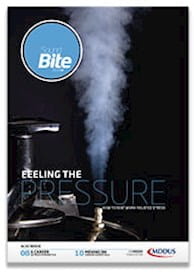“MISTAKES are going to happen. Acknowledge them. Rectify them. Learn from them. Move on.” These words spoken by US President Josiah Bartlett in The West Wing can equally be applied to complaints.
There is nothing like a real or alleged error to stimulate the flow of adrenaline, initiating the fight-or-flight response. In real-life dentistry both reactions are the wrong way to deal with a mistake. A fight, confrontation or denial, although instinctive, only leads into deeper waters. Similarly, once a mistake has been made, to try to flee from the fact and its consequences only compounds the error. Early in our careers there is a temptation to ignore things and hope they will go away. You might get away with it once or even twice but ultimately the problem will return to bite you.
It used to be the case that some of these patients would vote with their feet, sharing their complaints with a handful of friends and family to undo your carefully made reputation. Now this effect is magnified greatly as social media and the power of the internet give even the silent ones a voice.
So we need to flip our approach to complaints. Instead of being feared and avoided, negative feedback should be sought out and valued. It’s a scary thought isn’t it? Yet if we are to grow as professionals we need to ensure that we listen and communicate with great care and skill.
But first how can we minimise negative experiences? A drop of prevention is better than a bucketful of cure.
Before any treatment, make sure expectations are realistic, both yours and the patient’s. Do they truly understand what is involved? Do you run the risk of over-promising something that is then under-delivered in the patient’s eyes? Remember, words of caution said before treatment are a warning, but the same words said afterwards are an excuse.
Are you sure that you have the skills you need? Can you get some advice from a colleague on what might go wrong during the planned treatment?
If something doesn’t go to plan then take the opportunity to share it with a senior colleague, sooner rather than later; don’t plough on hoping that it might work out for the best.
During the treatment did you keep the patient informed of the process? Did you tell them what was going to be happening next? If something happens that might increase treatment time, explain what, why and how long. Make sure you tell them what to expect over the next few days, and let them know if you’ve made changes to the treatment plan.
After treatment, did you follow-up on anything where the patient might be expected to have pain or swelling? The telephone is still one of our greatest tools and a brief, sympathetic call can work wonders.
Do you know the practice protocols for dealing appropriately with any negative feedback? Don’t let a telephone call that could prove to be a great learning experience for all escalate into a full-blown complaint. People want someone to listen to them. If necessary, return the call. Make sure that you understand fully what the concerns are and tell the patient what you will do to put things right and then do it.
Always say sorry, even if you are absolutely sure that your treatment, advice or procedure has been as good as it could be. Start any conversation with the words: “I am sorry to hear that” – and mean it.
Your efforts may prove unsuccessful and the patient may want to make a formal complaint. Ensure that you follow current guidelines and the patient understands how to go about voicing their concerns. Be on the patient’s side. Avoid anything that could be interpreted as adversarial. Keep your trainer informed at all times.
Deal with things quickly; if possible arrange to meet the patient face-to-face. Don’t drag your heels in the hope that it will go away, or take a complaint personally.
When you do meet the patient, keep your composure, know the complaint procedures, take notes, be sympathetic and apologise for the fact that the patient has had to complain. Tell the patient the time frame in which they can expect action and stick to it.
Investigate and keep the patient informed at every stage of the process. Communicate what you have learned. This might include an admission that things were not quite as they should have been, followed by an explanation of the actions that have been taken to avoid any repetition of the error or perceived slip in service standards. Be honest and transparent.
If the complaint cannot be dealt with satisfactorily in-house or the patient is requesting compensation then contact MDDUS immediately. They are the experts and will be used to handling on a daily basis the problems that happen for you once in a blue moon.
Alun K Rees BDS is The Dental Business Coach. An experienced dental practice owner who changed career, he now works as a coach, consultant, troubleshooter, analyst, speaker, writer and broadcaster. www.dentalbusinesscoach.co.uk
This page was correct at the time of publication. Any guidance is intended as general guidance for members only. If you are a member and need specific advice relating to your own circumstances, please contact one of our advisers.
Read more from this issue of Insight Primary

Save this article
Save this article to a list of favourite articles which members can access in their account.
Save to library